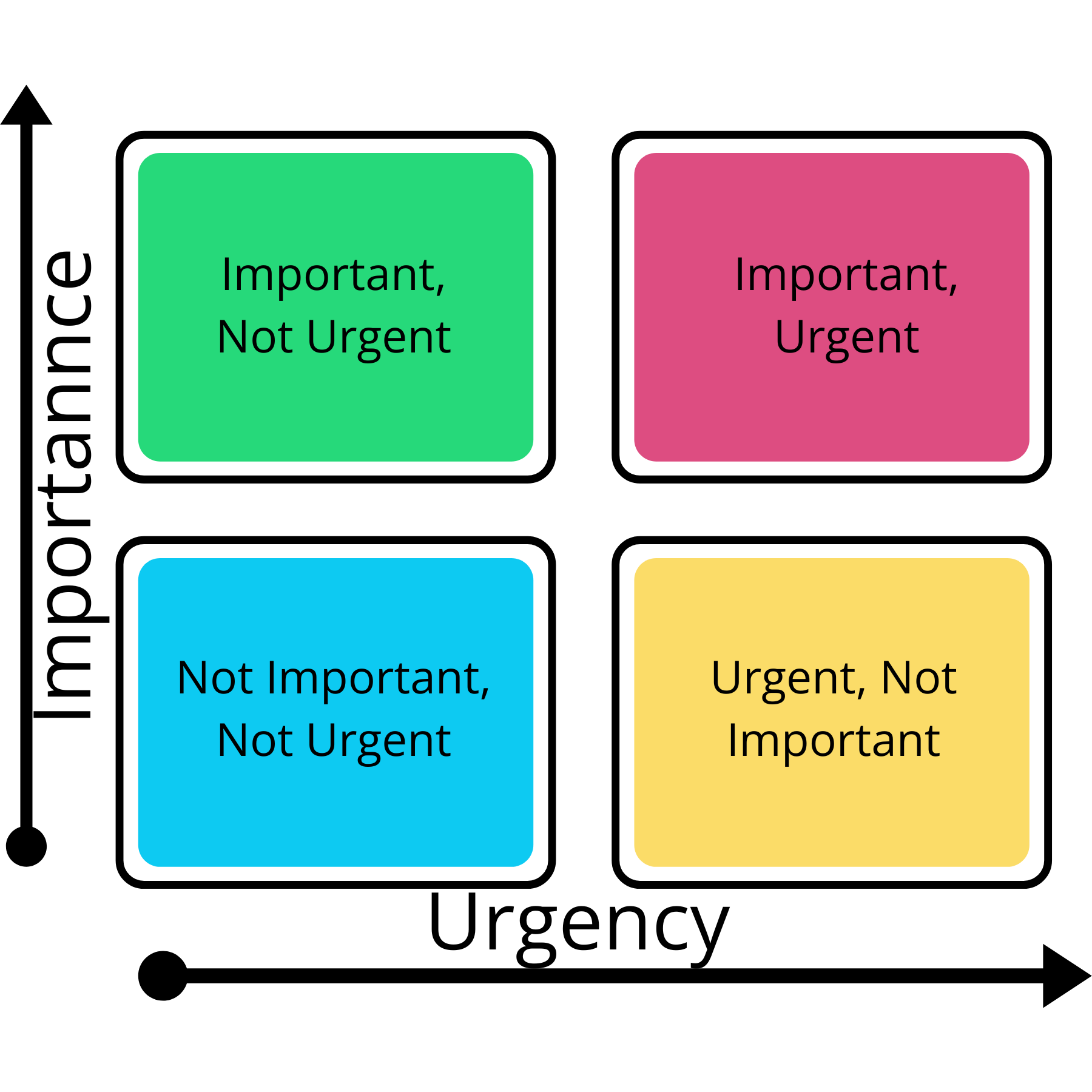7 Tips - How to Stay Organized in Life and at Work

Check out the following useful tips for staying organized when busyness happens.
Have you ever found yourself overwhelmed by the constant stream of tasks in your personal and work life? If so, you’re not alone! We’ve all felt that way at some point. Check out the tips below for effective ways to stay organized and on top of your responsibilities, leaving you with more breathing room to keep moving forward. (Pro Tip: Questions like "How do you prioritize competing tasks at work?" are often asked in interviews, so be ready with your response!)
1. Utilize the Eisenhower Matrix
As illustrated in the image below, organizing your daily tasks into "priority" boxes can help you determine the right amount of time and effort to dedicate to each task. You may find that some tasks are not as crucial as you initially thought!
2. Keep a Clean Workspace
If you have a desk with multiple cubbies for storage, it's important to prevent them from becoming cluttered "junk drawers." Take a moment to consider which supplies you frequently use and keep those within easy reach. For items that are not used regularly, consider storing them in a convenient and accessible space away from your desk.
Having pictures, plants, figurines, etc., at your workspace can bring a touch of personalization and inspiration to your surroundings. However, these items mustn't overcrowd your desk. Consider using organizer shelves to display these items while optimizing space. By minimizing the time spent decluttering and organizing excessive items, you'll free up more time for important tasks. This approach is beneficial both in a work or home environment.
3. Create a Filing System
Whether you lean towards a traditional filing cabinet with manila folders or opt for digital tools like Google Drive or Dropbox, these options can help reduce the stress of wondering, "Where did I last see it?" When using a physical filing system, ensure you have proper dividers and tabs for easy navigation through various folders. For digital files, remember to back up your documents to avoid the hassle of sifting through virtual trash for accidentally deleted items.
Establishing a naming convention for your files can enhance organization. Some people opt for an alphabetical system, while others prefer using numbers to differentiate between various file collections. Read more about creating naming conventions here.
4. Utilize Digital Resources
Calendars, alarm clocks, sticky notes, and other items can quickly clutter your workspace. Instead of having these items physically on your desk, think about digitizing them. Most computers and laptops come with applications that can perform the same functions as their paper counterparts.
5. Develop a Routine
How often do we hear from healthcare professionals about the benefits of establishing a consistent morning and bedtime routine to enhance overall sleep quality? Or how certain breakfast choices and exercises can boost our energy levels? There is indeed truth to the power of routine. However, it doesn't mean life has to be dull and repetitive. Instead, having a structured approach to these seemingly mundane tasks will better prepare you to tackle unexpected challenges.
To kickstart your day, take a moment to plan out how you can set yourself up for success. If you have a busy day ahead with lots of traveling, whether for work or leisure, start by ensuring you have enough gas in your car’s tank. If your day is filled with repetitive tasks, create a fun music playlist to energize and motivate you. And if you tend to get lost in your work and forget to take breaks, set a reminder to pause and grab a bite to eat or do a few stretches.
6. Establish Balance
Take some time to relax and recharge by reflecting on things that bring you joy and excitement, and set aside time to do them. It's important to find a balance between relaxing and energizing activities to prevent burnout. Remember to take breaks in between tasks, and if you start feeling sluggish, stand up, stretch, grab a drink, listen to some upbeat music, or do whatever helps you feel refreshed and re-energized!
7. Maintain a Good Support System
This can vary depending on whether you're looking to improve your personal or work life. It's beneficial to connect with individuals who share your interests and enjoy similar activities. These individuals could be friends, family, pets, or even work colleagues!
In the workplace, it's important to cultivate positive relationships with your coworkers and supervisors, as you will likely interact with them regularly. Take the time to get to know your colleagues, and find ways to strengthen these relationships through team-building activities, casual chats over lunch, collaborative projects, etc.
If you fall behind on a task, having a good support system at work can get you back on track. If you’re in a remote position, this may look slightly different. Even if you work mostly on your own, having an open line of communication between you and your supervisor can provide you with guidance and help clarify expectations, such as meeting deadlines, attending meetings, taking approved vacation time, etc.
For additional ideas on how to stay organized, check out this article on Indeed.
Conclusion
Maintaining organization in both your personal and professional life is a journey that requires time and effort. Don't be discouraged if things don't immediately fall into place! Start small by establishing routines for your daily tasks and activities. Identify where you want to focus your time and energy using the Eisenhower Matrix. Ensure that you are setting yourself up for success by organizing and/or digitizing your resources, and surrounding yourself with a supportive network!

